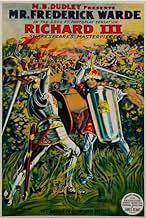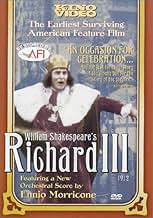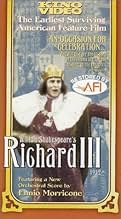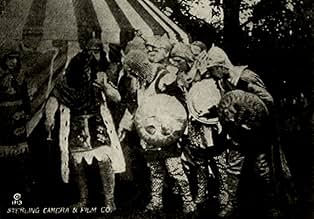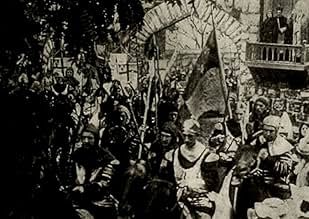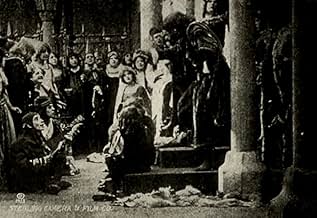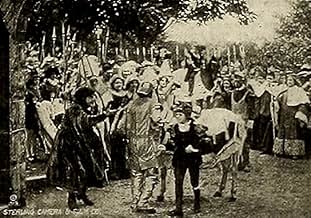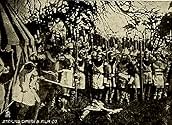अपनी भाषा में प्लॉट जोड़ेंRichard of Gloucester uses manipulation and murder to gain the English throne.Richard of Gloucester uses manipulation and murder to gain the English throne.Richard of Gloucester uses manipulation and murder to gain the English throne.
- निर्देशक
- लेखक
- स्टार
फ़ीचर्ड समीक्षाएं
The viewer would do well to compare this film with Frank Benson's British film of the same play released in 1911, one year before Warde's. Both the similarities and differences are illuminating. The costumes are of course very similar--it would be years before modern dress Shakespeare would get onto film. The way the scenes of Edward's court are set are very similar. Such scenes were the staple of Victorian Shakespeare. Both films use narrative title cards to explain to the viewer what is going on; later in the silent era they would contain dialogue more than narration. The similarities show us what was the state of Shakespearean production and cinema standards at the time.
The major difference that one sees is that Benson tries to put you in row fifteen of the Drury lane theatre during one of his performances. The camera never moves and every shot is a long shot. You can't see Benson's face in any of them. All have what is clearly a stage set behind them, and the actors move from side to side primarily because they feel constrained by the backdrop and the footlights.
Warde's approach is best shown in a scene where Richard is riding to the Tower to do in Henry VI. It is shot outside on location. The camera is raised above head level. Richard rides from the distance toward the camera passing behind the camera to the right. It is a scene only possible in film; you could never see such a thing on stage.
Warde's camera is consistently closer to the action than Benson's so that the actor's faces are usually visible. He makes use of high level cameras to see Richard on a balcony and a crowd below and intercuts these with interiors so that one imagines the balcony to be attached to the interior.
In other words, the scenes here are conceived cinematically not theatrically. Warde was not the first to do this even in a Shakespeare film but it does make his film easier and more interesting to watch than his contemporary's.
Alas, his characterization of Richard leaves something to be desired; he stomps about like a troll from a Brothers Grimm story. Before closeups became standard, the only tool an actor could use in a silent film was his bodily movement, and Warde's lacks the subtlety to convey anything more than a caricature. As a result the film, despite being of historical interest, reasonably well paced and shot with a cinematic eye, will fail, I think, to really grip most modern viewers' interest.
The major difference that one sees is that Benson tries to put you in row fifteen of the Drury lane theatre during one of his performances. The camera never moves and every shot is a long shot. You can't see Benson's face in any of them. All have what is clearly a stage set behind them, and the actors move from side to side primarily because they feel constrained by the backdrop and the footlights.
Warde's approach is best shown in a scene where Richard is riding to the Tower to do in Henry VI. It is shot outside on location. The camera is raised above head level. Richard rides from the distance toward the camera passing behind the camera to the right. It is a scene only possible in film; you could never see such a thing on stage.
Warde's camera is consistently closer to the action than Benson's so that the actor's faces are usually visible. He makes use of high level cameras to see Richard on a balcony and a crowd below and intercuts these with interiors so that one imagines the balcony to be attached to the interior.
In other words, the scenes here are conceived cinematically not theatrically. Warde was not the first to do this even in a Shakespeare film but it does make his film easier and more interesting to watch than his contemporary's.
Alas, his characterization of Richard leaves something to be desired; he stomps about like a troll from a Brothers Grimm story. Before closeups became standard, the only tool an actor could use in a silent film was his bodily movement, and Warde's lacks the subtlety to convey anything more than a caricature. As a result the film, despite being of historical interest, reasonably well paced and shot with a cinematic eye, will fail, I think, to really grip most modern viewers' interest.
Like many a heralded silent movie, this was lost for many years. Then it turned up in a private collection, and was donated to the AFI. They got Ennio Morricone to write a score and released it, claiming it was the first American feature, and the first Shakespearean feature.
It's true enough that Shakespeare is credited as a writer, and it follows the events of his play, but to offer a silent version of Shakespeare with not one of his lines seems to me to avoiding the pith and purpose of Shakespeare. True, few can cite more than three lines: "A horse, a horse, my kingdom for a horse"; "Now is the winter of our discontent made glorious summer by the sun of York"; and "Was ever a woman in this humor wooed? Was ever a woman in this humor won?" And usually they don't understand the second and misquote the third as "Was ever a woman so rudely wooed?". This led me and a friend to plot a production with Groucho Marx as Richard, Margaret Dumont as Anne, with similar casting throughout.
Not one of Shakespeare's lines is offered, reducing the play to sheer pomp and pageantry. This avoids the problem that Richard is one of Shakespeare's worst-written characters: an enormously cynical, murderous, and successful politician until he becomes King, who then turns into an idiot; a cowardly and feeble hunchback who is a monstrously courageous and doughty warrior in war. All this in service of the Elizabethan-era truth that he should never have been king, and that her grandfather performed a valiant deed by slaying Richard on the battlefield.
The result is a movie made in the Illustrated Text style of movie making without quoting one line of text. There are lots of extras shaking spears. I suppose that's enough for people who want to say they've seen Shakespeare. As for Frederick Warde, who plays Richard here, he later wrote
"I found the action of the camera necessitated entirely different methods of acting from the stage. Spontaneity must be replaced by deliberation and concentrated expression take the place of words. I had much to learn and considerable to unlearn but the director and photographer were very considerate, although my ignorance of the necessities of the camera must have tried their patience almost to the limit."
Which brings us back to another popular Groucho quote. Enough said.
It's true enough that Shakespeare is credited as a writer, and it follows the events of his play, but to offer a silent version of Shakespeare with not one of his lines seems to me to avoiding the pith and purpose of Shakespeare. True, few can cite more than three lines: "A horse, a horse, my kingdom for a horse"; "Now is the winter of our discontent made glorious summer by the sun of York"; and "Was ever a woman in this humor wooed? Was ever a woman in this humor won?" And usually they don't understand the second and misquote the third as "Was ever a woman so rudely wooed?". This led me and a friend to plot a production with Groucho Marx as Richard, Margaret Dumont as Anne, with similar casting throughout.
Not one of Shakespeare's lines is offered, reducing the play to sheer pomp and pageantry. This avoids the problem that Richard is one of Shakespeare's worst-written characters: an enormously cynical, murderous, and successful politician until he becomes King, who then turns into an idiot; a cowardly and feeble hunchback who is a monstrously courageous and doughty warrior in war. All this in service of the Elizabethan-era truth that he should never have been king, and that her grandfather performed a valiant deed by slaying Richard on the battlefield.
The result is a movie made in the Illustrated Text style of movie making without quoting one line of text. There are lots of extras shaking spears. I suppose that's enough for people who want to say they've seen Shakespeare. As for Frederick Warde, who plays Richard here, he later wrote
"I found the action of the camera necessitated entirely different methods of acting from the stage. Spontaneity must be replaced by deliberation and concentrated expression take the place of words. I had much to learn and considerable to unlearn but the director and photographer were very considerate, although my ignorance of the necessities of the camera must have tried their patience almost to the limit."
Which brings us back to another popular Groucho quote. Enough said.
Watching Shakespeare without dialog isn't as challenging as you might think. Indeed, this 1912 film manages to condense the play neatly and still retains much of the power of the piece without hearing - or even reading - the words. Much of the success of "Richard III" is due to the vivid characterization by Frederick Warde, but his costars are excellent too. The direction is basic, of course, and every so often director-star James Keane wastes precious time (what's up with that long semi-tracking shot of the ship?), but generally his work is more than adequate. Comparing Keane's work here to the pioneering 1911 Italian feature "L'Inferno", it's clear that the American did have knowledge of what was going on elsewhere, even if he (of course) fell far short of what D.W. Griffith was already doing. Overall, "Richard III" will be of considerable interest to silent-film fans as well as stage performers interested in viewing the work of 19th century master Warde. Otherwise, I doubt this movie will thrill many other viewers. But I could be wrong; check it out for yourself.
Historically important as it is the oldest known complete surviving feature film made in the US, Richard III does a decent enough job of making Shakespeare's play accessible to the masses - although watching a Shakespeare play without words is like looking at a portrait in a dark room. The faces pulled by Shakespearean stage actor Frederick Warde suggest he thinks he's still playing to the Gods.
This was a very, very early full-length film. According to the video box, it was the first full-length American-made film, but that is debatable--as several films have made that claim and exactly what constitutes "full-length" is pretty vague. Regardless, I have to commend the cast for trying something unique and epic, though in today's light the film is a totally boring mess and only of interest to cinephiles. Instead of the modern notion of story-telling and action, the crew was breaking new ground and made a bizarre film that appears more like a series of vignettes instead of a coherent film. Instead of a moving and evolving narrative like we are used to, the film was made with a real-life traveling acting troop. But, instead of having them act out the story, the film shows inter-title cards that describe what has occurred and the cast pose like they are going to be photographed or just make a few minimal movements or actions until the next card appears to describe an all-new scene. It's almost like looking at a series of stereoscope cards that move just a little and all together tell a very, very dull story. Very static and horrid to watch, it DID try something different and this is an amazingly important film historically--I just would NEVER want to have to watch it again!
क्या आपको पता है
- ट्रिवियाThought lost for decades, but a pristine print (believed to be the oldest known complete surviving feature film made in the US) was discovered by a private collector in 1996 and donated to the American Film Institute.
- कनेक्शनFeatured in Keepers of the Frame (1999)
टॉप पसंद
रेटिंग देने के लिए साइन-इन करें और वैयक्तिकृत सुझावों के लिए वॉचलिस्ट करें
विवरण
- रिलीज़ की तारीख़
- कंट्री ऑफ़ ओरिजिन
- भाषाएं
- इस रूप में भी जाना जाता है
- Mr. Frederick Warde in Shakespeare's Masterpiece 'The Life and Death of King Richard III'
- फ़िल्माने की जगहें
- उत्पादन कंपनियां
- IMDbPro पर और कंपनी क्रेडिट देखें
बॉक्स ऑफ़िस
- बजट
- $30,000(अनुमानित)
- चलने की अवधि55 मिनट
- ध्वनि मिश्रण
- पक्ष अनुपात
- 1.33 : 1
इस पेज में योगदान दें
किसी बदलाव का सुझाव दें या अनुपलब्ध कॉन्टेंट जोड़ें


